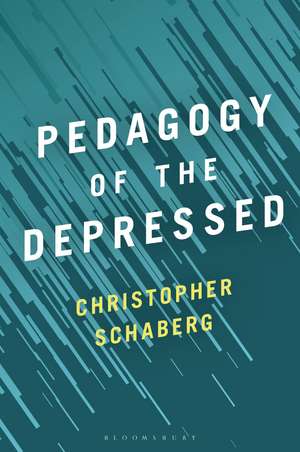Pedagogy of the Depressed
Autor Dr. Christopher Schabergen Limba Engleză Paperback – 9 mar 2022
| Toate formatele și edițiile | Preț | Express |
|---|---|---|
| Paperback (1) | 112.99 lei 22-36 zile | +19.71 lei 6-12 zile |
| Bloomsbury Publishing – 9 mar 2022 | 112.99 lei 22-36 zile | +19.71 lei 6-12 zile |
| Hardback (1) | 374.22 lei 43-57 zile | |
| Bloomsbury Publishing – 12 ian 2022 | 374.22 lei 43-57 zile |
Preț: 112.99 lei
Preț vechi: 122.78 lei
-8% Nou
Puncte Express: 169
Preț estimativ în valută:
21.62€ • 22.63$ • 17.100£
21.62€ • 22.63$ • 17.100£
Carte disponibilă
Livrare economică 10-24 martie
Livrare express 22-28 februarie pentru 29.70 lei
Preluare comenzi: 021 569.72.76
Specificații
ISBN-13: 9781501364570
ISBN-10: 150136457X
Pagini: 184
Dimensiuni: 140 x 216 x 18 mm
Greutate: 0.24 kg
Editura: Bloomsbury Publishing
Colecția Bloomsbury Academic
Locul publicării:New York, United States
ISBN-10: 150136457X
Pagini: 184
Dimensiuni: 140 x 216 x 18 mm
Greutate: 0.24 kg
Editura: Bloomsbury Publishing
Colecția Bloomsbury Academic
Locul publicării:New York, United States
Caracteristici
Offers concrete strategies for teaching differently in (and in response to) this moment, e.g. slow reading, collaboration, going outside, bricolage, and so on
Notă biografică
Christopher Schaberg is Dorothy Harrell Brown Distinguished Professor of English at Loyola University New Orleans, USA. He is the author of The Textual Life of Airports: Reading the Culture of Flight (2011), The End of Airports (2015), Airportness: The Nature of Flight (2017), as well as The Work of Literature in an Age of Post-Truth (2018), and Searching for the Anthropocene: A Journey into the Environmental Humanities (December, 2019). He is co-series editor, with Ian Bogost, of Bloomsbury's Object Lessons series.
Cuprins
Prologue: No Place Like HomeIntroduction: The Depressed1. We're All Screens2. Early Warnings3. Learning Management4. Against Sheep5. Trigger U.6. Ecophobia7. Environmental Humanities?8. Public Humanities?9. Skimming the Surface10. Autotheory11. Beginnings12. Chance Meeting13. Theory Today14. END MEETING FOR ALL15. Night Writing16. Less Grading17. Tenure18. Exhaustion19. Well-Rounded20. Turning Kids into Capital21. Writing Together22. Adjusting23. First-Year Seminar24. Pitt's Law25. Into the Unknown
Recenzii
What readers may not anticipate and should be delighted by the presence of, is a vast range of topics-seemingly randomly interspersed throughout the book-that break up the chapters of both theoretical musings and practical applications of managing the college literature classroom in the early twenty-first century world of pandemic lockdowns, changing university concerns, and the post-Postmodern world of businessmen in the White House. The honest tone of Schaberg's prose is refreshingly welcome-he is continuously questioning what he is doing, why, and how is it affecting his students as well as providing critiques of what is wrong with higher education. [...] The optimism and pessimism of our current teaching mode alternate throughout Pedagogy of the Depressed. Schaberg's deepest concerns mirror many of ours. That administration will not see moving online as a fearful, temporary situation, but rather as a new efficient system that eliminates all sorts of issues, including those of class size limits or scheduling issues. We are depressingly isolated from our colleagues and valuable impromptu discussions and collaborations. A bonus? Throughout the book, Schaberg also talks about other texts that speak to the issues he is addressing. This is a great, and much appreciated, way to increase our academic TBR piles.
How do you teach through trauma? All college instructors have found themselves facing this question in recent days, but few with the insight and poignancy of Christopher Schaberg. Pedagogy of the Depressed provides both diagnosis and balm for those anxious about the possibilities for higher education in the midst of climate change and active shooter events and pandemic response and budgetary collapse, a profound reckoning with the conditions of learning today.
If the title page didn't say Christopher Schaberg so plainly, I might have assumed the author was Guy Montag, protagonist of Ray Bradbury's Fahrenheit 451. Both are suffering through a takeover by the machinery, technological and bureaucratic; both hold onto a humanistic ideal in the midst of it all. Pedagogy of the Depressed is in some ways precisely the opposite of what its title promises: rather than depressing, it's a hopeful pushback against the pervasive air of depression and lowered expectations that has overtaken too many of our classrooms, and whose metaphor-if not cause-is Covid-19 and the ubiquity of the Zoom screen. Come for the jeremiad-but stay for the wise encouragement, that this work we do with students still matters. Perhaps matters more than ever.
How do you teach through trauma? All college instructors have found themselves facing this question in recent days, but few with the insight and poignancy of Christopher Schaberg. Pedagogy of the Depressed provides both diagnosis and balm for those anxious about the possibilities for higher education in the midst of climate change and active shooter events and pandemic response and budgetary collapse, a profound reckoning with the conditions of learning today.
If the title page didn't say Christopher Schaberg so plainly, I might have assumed the author was Guy Montag, protagonist of Ray Bradbury's Fahrenheit 451. Both are suffering through a takeover by the machinery, technological and bureaucratic; both hold onto a humanistic ideal in the midst of it all. Pedagogy of the Depressed is in some ways precisely the opposite of what its title promises: rather than depressing, it's a hopeful pushback against the pervasive air of depression and lowered expectations that has overtaken too many of our classrooms, and whose metaphor-if not cause-is Covid-19 and the ubiquity of the Zoom screen. Come for the jeremiad-but stay for the wise encouragement, that this work we do with students still matters. Perhaps matters more than ever.
